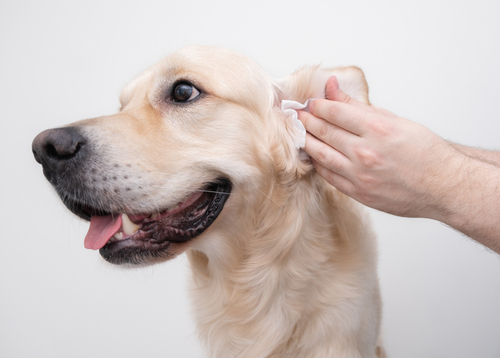
This article was updated on May 24th, 2023
Ear infections are one of the most common complaints I see from owners in the clinic, and it seems Golden Retrievers are particularly predisposed. But why exactly do Golden Retrievers suffer more than many other breeds? And what can owners do to help? Here I will answer some of the most common questions I hear about ear infections in golden retrievers
Are Golden Retrievers prone to ear infections? Why?
Yes, Golden Retrievers are generally more prone to ear infections than most other breeds. This is partly because they have floppy ears that can trap moisture, wax, and dirt inside the ear canal, providing a breeding ground for bacteria and yeast. Additionally, since Golden Retrievers have thick fur around their ears it can be difficult to clean them well and keep them dry. All these factors increase the likelihood of an infection.
In addition to this, skin allergies can predispose Golden Retrievers to ear infections; while any breed of dog can suffer from allergies, Goldies may be more prone to allergies compared to some other breeds. This could be due to environmental allergens, such as pollen or dust, or food allergens. Food allergies are particularly common in Golden Retrievers, often to ingredients in dog food, such as chicken or beef. Allergies result in itchy, inflamed skin which provides the perfect opportunity for bacteria or yeast to take hold and cause an ear infection.
Golden Retrievers are 2 times more likely to get ear infections
While Golden Retrievers may be genetically predisposed, the frequency of ear infections varies from dog to dog and mainly depends on the individual’s environment and lifestyle. One study showed that Golden retrievers are 2.23x more likely to suffer from ear infections when compared to cross-breed dogs. The study also found that Golden Retrievers accounted for about 14% of ear infections reported.
If a Golden Retriever lives in an area with high pollen counts or spends a lot of time indoors, their risk for ear infections may be higher. Additionally, if the dog’s ears are not regularly cleaned and dried, this can increase their risk for infection. That being said, if a Golden Retriever is cared for properly, it may not develop any ear infections at all. Other factors that increase the risk of ear infection include:
- Their propensity for allergies
- Ear anatomy
- Swimming or bathing habits
How can I spot when my Golden Retriever gets an ear infection?
There are several signs that you can look for to help identify if your Golden Retriever has an ear infection It’s important to regularly check your dog’s ears and look out for the following symptoms:
1. Scratching or pawing at the ears: Dogs with ear infections may scratch or paw at their ears frequently due to discomfort or itching.
2. Head shaking or head tilt: Your dog may shake their head vigorously or tilt their head to one side.
3. Foul odor: A bad smell coming from your dog’s ears can be a sign of an infection.
4. Discharge or redness: If there is discharge, redness, or inflammation in the ears, it may indicate an infection.
5. Sensitivity or pain: If your dog’s ears are sensitive or painful to the touch, they may have an infection.
If you notice any of these symptoms, it’s important to take your dog to the veterinarian for quick diagnosis and treatment.
8 things to do at home to minimize ear infections with your Golden Retriever

There are several steps you can take to help prevent or reduce your Golden Retriever’s risk for ear infections.
1. Clean your retriever’s ears regularly: Regularly cleaning your dog’s ears can help reduce the buildup of dirt, wax, and debris that can lead to infection. Be sure to use a veterinarian recommended ear cleaner. Avoid using cotton swabs, which can push debris further into the ear canal.

2. Keep their ears dry: Keeping your dog’s ears dry can help reduce their risk for infection. After swimming, make sure to wipe down their ears with a soft cloth and let them air-dry.
3. Trim hair around their ears: The hair around Golden Retrievers’ ears can become long and floppy. Long hair can trap moisture and debris, leading to infections. Consider trimming your Golden Retriever’s hair around the ears regularly to keep them clean and dry. Read our article: 6 Steps to Pluck Dog Ear Hair [with pics & vet advice]
4. Check your dog’s ears regularly to catch new infections. It is important to check your Golden Retriever’s ears regularly for signs of infection, such as redness, swelling, discharge, or a foul odor. If you notice any of these symptoms, take your dog to the veterinarian for an evaluation and treatment.
5. Feed a healthy hypoallergenic diet: A well-balanced hypoallergenic diet can help reduce your dog’s risk for ear infections. Try to avoid foods with ingredients that may trigger allergies, such as beef or chicken. Symptoms of allergies include red or itchy ears, as well as red rashes, itching, allergy sneezing or coughing, eye discharge or gastrointestinal issues.
6. Reduce environmental allergens: While this is not always possible, try to keep your dog away from environmental allergens as much as you can such as pollen or dust.
7. Treat underlying health conditions: Some health conditions, such as hypothyroidism or autoimmune disorders, can make dogs more prone to ear infections. It’s important to work with your veterinarian to manage any underlying health conditions that may be contributing to ear infections.
8. Regular veterinary checkups: Regular veterinary checkups can help identify and treat ear infections early, preventing them from becoming more serious.
Please note that these home tips are NOT a substitute for veterinary care. Most ear infections require veterinary treatment. An ear infection that does not get treated can lead to significant complications and pain for your dog.
Veterinarian treatment of ear infections

If your Golden Retriever has an ear infection, it is important to take them to the veterinarian for diagnosis and treatment. The vet will perform a physical examination of their ears, as well as other tests such as an otoscope or imaging tests. The treatment for ear infections in Golden Retrievers depends on the severity and underlying cause of the infection. In general, treatment may involve the following:
1. Thorough ear cleaning: The first step in treating an ear infection is to clean the ear thoroughly to remove debris, wax, and any discharge. Your veterinarian may use a special ear cleaning solution to clean the ear. In some cases, it may even be necessary to sedate your dog for a full ear flush.
2. Medications: Depending on the severity of the infection and the underlying cause, your veterinarian may prescribe topical or oral medications. Topical medications may include ear drops, creams, or ointments to be applied directly into the ear canal. Oral medications may include antibiotics, antifungal medications, or steroids to reduce inflammation and itching.
3. Addressing underlying causes: If the ear infection is caused by an underlying condition such as allergies or hypothyroidism, it is important to address and manage that condition to prevent ear infections. Your vet might recommend a hypoallergenic diet trial or allergy blood testing.
Learn more about the types of ear infections in dogs (with pictures) & veterinary advice.
Related posts:
Disclaimer: This website's content is not a substitute for veterinary care. Always consult with your veterinarian for healthcare decisions. Read More.




Be the first to comment